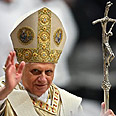
Church back to old ways
Catholic Church falls into line with Right, maintains conservative worldview
The relative liberalism and the Church's openness from the 1960s and onward were a result of the Church recognizing the damage it suffered by cooperating with regimes such as Franco's in Spain or Mussolini's in Italy. In particular, the Vatican's ambivalent attitude to Nazism undermined the Church's moral authority.
The Catholic Church indeed continued to support dictators who fought communism, yet the world church started resisting the death penalty and wars, and support democratic regimes on principle. The Church did not abandon other aspects of conservatism all along this period: The support offered to Western democracies became the lesser evil, in the face of the world's division in the Cold War between the West and communism, as hostility between the Church and communism continued unabated.
The alliance between the Church and the "freedom fighters" who also fought for freedom of religion enabled the Church to present itself as an enlightened element, while at the same time it continued to fight against contraceptives and abortions, thus contributing to the spread of sexually transmitted diseases and a significant rise in the population of its believers, particularly in the Third World.
The Catholic Church was also able to sympathize with the West's free economy, as since it established itself in the 4th Century, it always maintained excellent ties with the elites in power, while establishing philanthropy as a form of helping the poor.
Liberation theology, or "church of the poor," is yet another clear example of a social reform movement in the Catholic Church. As we know, the latter started its way as a social-religious movement among the Roman Empire's poor. Only after it was recognized as a national religion and following the construction of a religious-bureaucratic mechanism did it start pulling away from a worldview that stresses equality among believers.
Social reform to be suppressed
Over the past 1,700 years, several attempts have been undertaken to "repair" the Church, and we also saw splits within it that stemmed from Catholicism's enthusiastic dedication to economic-political elites, as well as its indifference in the face of social distortion and a class-based society.
From the French Revolution to the end of World War II, the Church was part of the conservative camp. However, the Church establishment did not object to economic changes in the Western world, but rather, traditionally backed the new elites that emerged from the industrial revolution, as long as the common interests of the nationalistic Right remained common (following World War II, the Western bloc's interests became the basis for cooperation.)
The Soviet Union's collapse boosted the conservative camp of the Church's leadership. The growing distance from the Holocaust eliminated the need to display enlightenment to atone for the Church's conservative, dark positions in the past. The primeval fears of a communist awakening disturb the Church much more than population explosion in the Third World or the spread of the AIDS epidemic.
Just as in the Middle Ages the Church came out against orders that condemned its wealth and corruption, the same is true today. The Church falls into line with the Right, alongside fans of globalization and neo-conservatives, against abortions and social solidarity, and in favor of philanthropy and a free market.
The liberation movement will be suppressed just as all other fans of social reform in the Church were suppressed over the past 1,500 years. To this day, the Church has not condemned Franco and Mussolini, Pinochet, and the other generals who ruled South and Central America during dozens of years of military revolutions tainted by the blood of innocents; these dictators did not threaten it – the priest of the poor actually does.
The writer is a PhD candidate at the History Department of Hebrew University in Jerusalem










